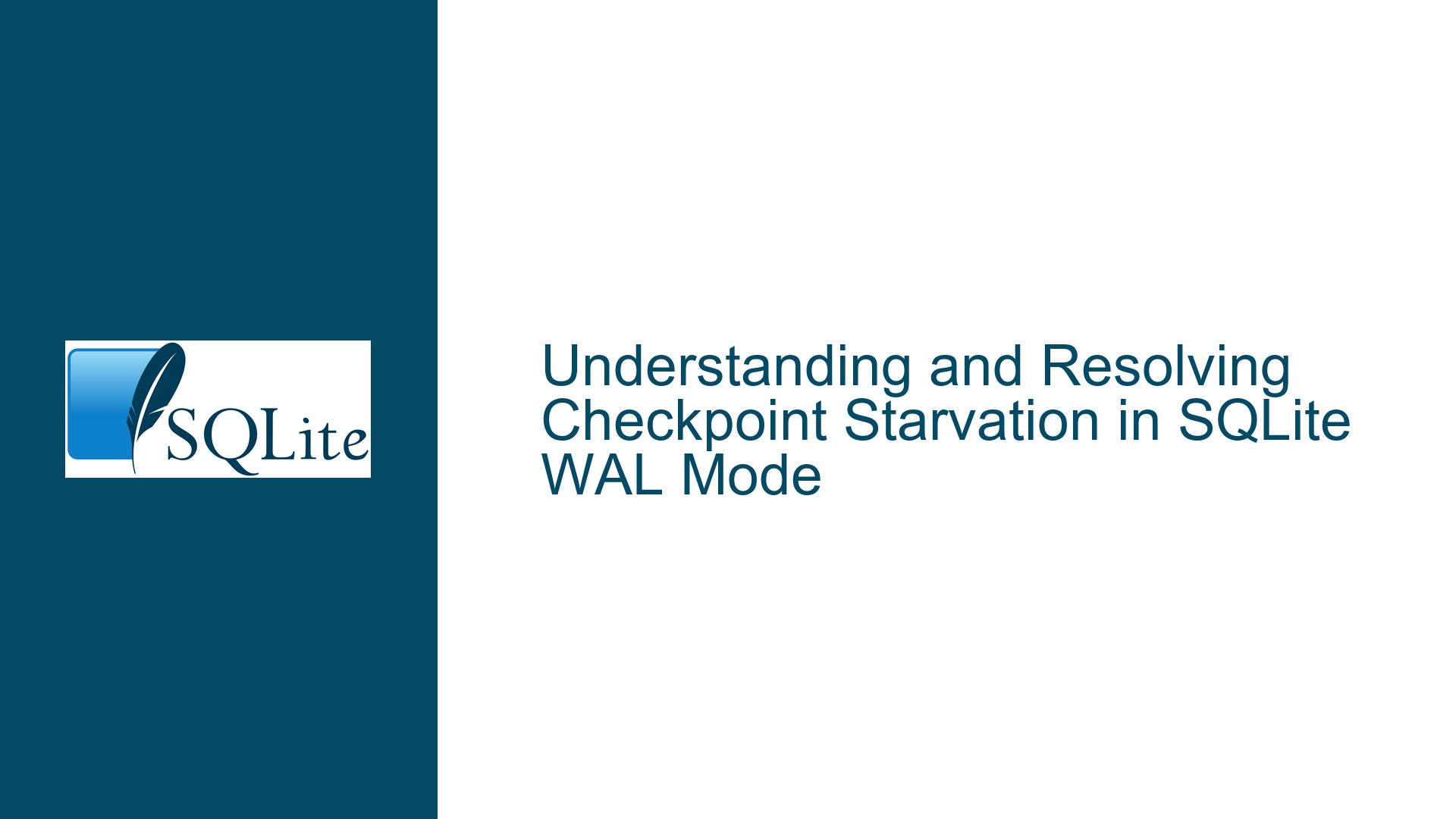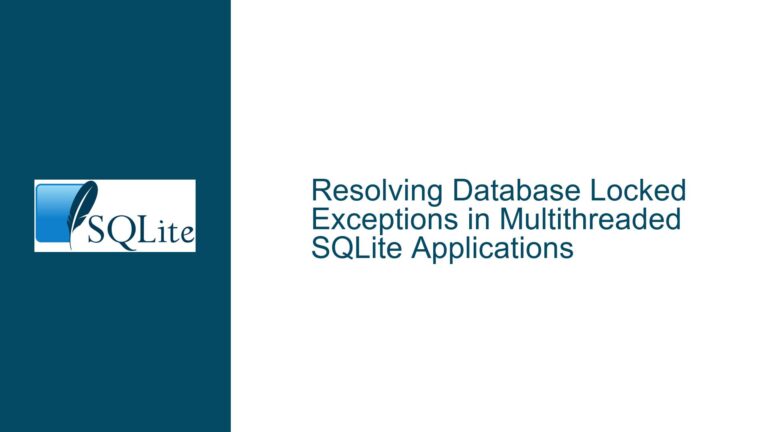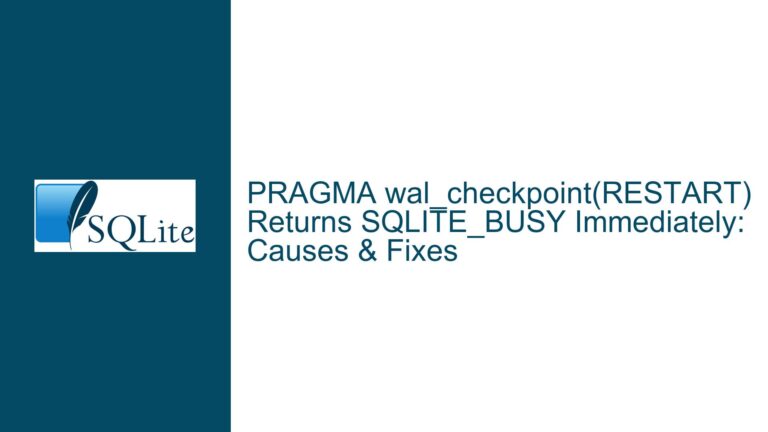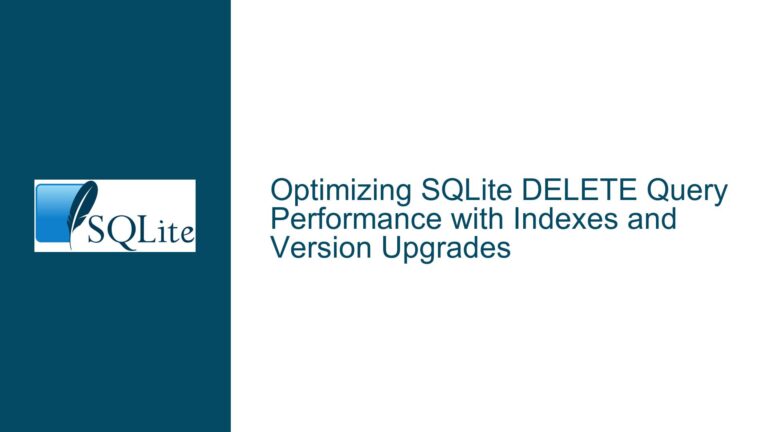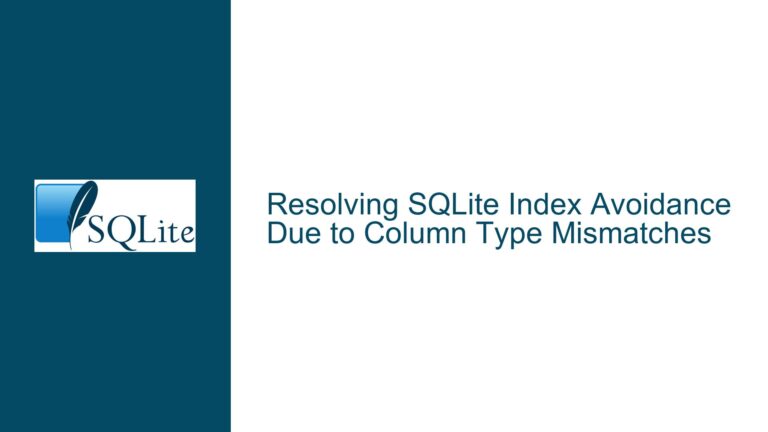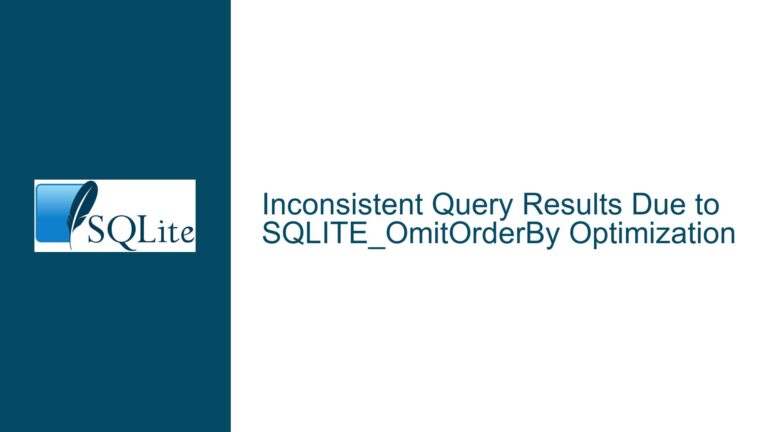and Resolving Checkpoint Starvation in SQLite WAL Mode
Issue Overview: Checkpoint Starvation and WAL File Growth in SQLite
Checkpoint starvation is a critical issue that can arise in SQLite when using Write-Ahead Logging (WAL) mode, leading to the uncontrolled growth of the WAL file. This problem occurs when a checkpoint operation, which is responsible for resetting the WAL file, is unable to complete because other database connections are holding open read transactions. The WAL file continues to grow as new transactions are committed, but the checkpoint process is blocked from reclaiming space in the WAL file, leading to potential performance degradation and excessive disk usage.
In the scenario described, the WAL file grows significantly, and the checkpoint operation is unable to reset the WAL file even after transactions are committed. The issue persists until the database connections holding the read transactions are closed. This behavior is particularly problematic in multi-threaded applications where multiple worker threads interact with the database concurrently. The problem is exacerbated when transactions are wrapped in BEGIN IMMEDIATE statements, which are intended to act as mutexes to prevent concurrent transactions but do not prevent checkpoint starvation.
The core of the issue lies in the interaction between transactions, connections, and the checkpointing mechanism in SQLite. When a transaction is committed, it does not necessarily release the read transaction held by the connection. Instead, the connection may continue to hold the read transaction open, preventing the checkpoint from resetting the WAL file. This behavior is further complicated by the use of prepared statements, which can also hold read transactions open if not properly reset or finalized.
Possible Causes: Why Checkpoint Starvation Occurs
Checkpoint starvation in SQLite can be attributed to several factors, each of which contributes to the inability of the checkpoint process to reset the WAL file. Understanding these causes is essential for diagnosing and resolving the issue.
1. Open Read Transactions: The primary cause of checkpoint starvation is the presence of open read transactions held by other database connections. According to SQLite’s documentation, a checkpoint can only reset the WAL file if there are no other connections using the WAL file. If a connection holds a read transaction open, the checkpoint process is blocked, and the WAL file continues to grow. This is true even if the transaction has been committed, as committing a transaction merely downgrades a write transaction to a read transaction rather than fully releasing it.
2. Prepared Statements Holding Read Transactions: Another common cause of checkpoint starvation is the presence of prepared statements that have not been properly reset or finalized. When a prepared statement is executed but not reset, it can hold a read transaction open, even if the transaction has been committed. This is particularly problematic in environments where prepared statements are used extensively, as the connection may inadvertently hold multiple read transactions open, preventing the checkpoint process from completing.
3. Python sqlite3 Library Behavior: The Python sqlite3 library introduces additional complexity due to its default behavior of keeping a transaction open at all times. This behavior is intended to simplify transaction management but can lead to checkpoint starvation if not properly managed. In the scenario described, the Python connection wrapper keeps a transaction open even after a commit, which prevents the checkpoint process from resetting the WAL file. This behavior can be mitigated by explicitly managing transactions or changing the isolation level of the connection.
4. Multi-Threaded Application Design: In multi-threaded applications, the interaction between worker threads and the database can exacerbate checkpoint starvation. When multiple threads interact with the database concurrently, each thread may hold open read transactions, preventing the checkpoint process from completing. This is particularly problematic when transactions are wrapped in BEGIN IMMEDIATE statements, as these statements do not prevent checkpoint starvation. Instead, they act as mutexes to prevent concurrent transactions but do not release the read transactions held by the connections.
5. WAL File Shrinkage Behavior: The observed behavior of the WAL file not shrinking after a commit is another factor contributing to checkpoint starvation. According to SQLite’s documentation, a checkpoint should occur whenever a commit causes the WAL file to exceed 1000 pages in size or when the last database connection on a database file closes. However, in the scenario described, the WAL file does not shrink after a commit, even though the checkpoint process is expected to trigger. This behavior suggests that the checkpoint process is either not occurring or is being blocked by other factors, such as open read transactions or prepared statements.
Troubleshooting Steps, Solutions & Fixes: Resolving Checkpoint Starvation
Resolving checkpoint starvation in SQLite requires a combination of diagnostic techniques, code modifications, and best practices to ensure that the checkpoint process can complete successfully. The following steps provide a comprehensive approach to diagnosing and resolving the issue.
1. Identify Open Read Transactions: The first step in resolving checkpoint starvation is to identify any open read transactions that may be blocking the checkpoint process. This can be done by querying the sqlite_stmt table to identify any pending prepared statements that may be holding read transactions open. The following query can be used to identify pending prepared statements:
SELECT sql FROM sqlite_stmt WHERE busy;
This query will return the SQL text of any prepared statements that are currently busy, indicating that they may be holding read transactions open. If any pending prepared statements are identified, they should be reset or finalized to release the read transactions.
2. Properly Manage Prepared Statements: To prevent prepared statements from holding read transactions open, it is essential to properly manage these statements by resetting or finalizing them after use. In environments where prepared statements are used extensively, such as in the Python sqlite3 library, this may require explicit management of the statements. For example, in Python, the cursor.close() method should be called to finalize the prepared statement and release any associated resources.
3. Modify Python Connection Behavior: The default behavior of the Python sqlite3 library, which keeps a transaction open at all times, can be modified to prevent checkpoint starvation. This can be done by changing the isolation level of the connection or by explicitly managing transactions. For example, the following code snippet demonstrates how to change the isolation level of a Python sqlite3 connection to None, which disables the default transaction management behavior:
import sqlite3
# Create a connection with isolation_level set to None
connection = sqlite3.connect('example.db', isolation_level=None)
cursor = connection.cursor()
# Explicitly manage transactions
cursor.execute('BEGIN IMMEDIATE')
# Perform database operations
cursor.execute('COMMIT')
By explicitly managing transactions, the connection will no longer hold read transactions open after a commit, allowing the checkpoint process to complete successfully.
4. Implement Thread Synchronization: In multi-threaded applications, it is essential to implement proper thread synchronization to prevent checkpoint starvation. This can be done by using Python locks to ensure that only one thread can hold a transaction open at a time. For example, the following code snippet demonstrates how to use a Python lock to synchronize access to the database:
import sqlite3
import threading
# Create a lock for thread synchronization
db_lock = threading.Lock()
def worker_thread():
with db_lock:
connection = sqlite3.connect('example.db', isolation_level=None)
cursor = connection.cursor()
cursor.execute('BEGIN IMMEDIATE')
# Perform database operations
cursor.execute('COMMIT')
cursor.close()
connection.close()
# Create and start worker threads
threads = [threading.Thread(target=worker_thread) for _ in range(10)]
for thread in threads:
thread.start()
for thread in threads:
thread.join()
By using a lock to synchronize access to the database, only one thread can hold a transaction open at a time, preventing checkpoint starvation.
5. Monitor WAL File Size and Checkpointing: To ensure that the WAL file is being properly managed, it is essential to monitor the size of the WAL file and the checkpointing process. This can be done by periodically querying the size of the WAL file and checking the status of the checkpoint process. The following query can be used to determine the size of the WAL file:
SELECT page_count FROM pragma_wal_checkpoint;
This query will return the number of pages in the WAL file, which can be used to monitor its size. If the WAL file continues to grow despite commits, it may indicate that the checkpoint process is being blocked by open read transactions or prepared statements.
6. Force Checkpoints When Necessary: In some cases, it may be necessary to force a checkpoint to ensure that the WAL file is reset. This can be done by manually invoking the checkpoint process using the sqlite3_wal_checkpoint_v2 function. In Python, this can be achieved using the sqlite3 module’s connection.wal_checkpoint() method. For example:
import sqlite3
connection = sqlite3.connect('example.db')
connection.execute('PRAGMA wal_checkpoint(FULL);')
This will force a checkpoint to occur, resetting the WAL file and reclaiming disk space. However, this should be used with caution, as forcing a checkpoint can impact performance.
7. Optimize Application Design: Finally, optimizing the design of the application to minimize the duration of transactions and the number of open connections can help prevent checkpoint starvation. This can be achieved by reducing the complexity of transactions, using connection pooling, and ensuring that connections are closed as soon as they are no longer needed. By minimizing the number of open connections and the duration of transactions, the likelihood of checkpoint starvation is reduced.
In conclusion, checkpoint starvation in SQLite is a complex issue that requires a thorough understanding of the interaction between transactions, connections, and the checkpointing mechanism. By identifying open read transactions, properly managing prepared statements, modifying Python connection behavior, implementing thread synchronization, monitoring WAL file size, forcing checkpoints when necessary, and optimizing application design, it is possible to resolve checkpoint starvation and ensure that the WAL file is properly managed.
